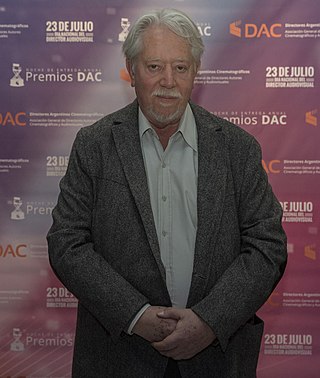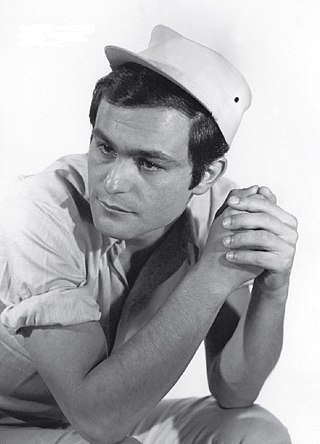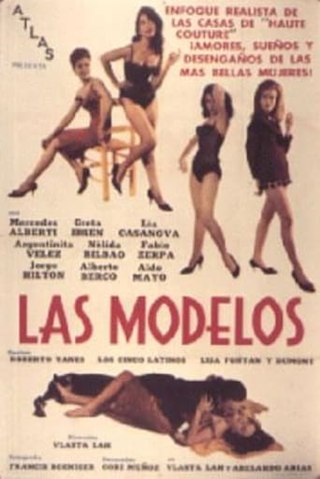
Cinema of Argentina refers to the film industry based in Argentina. The Argentine cinema comprises the art of film and creative movies made within the nation of Argentina or by Argentine filmmakers abroad.

Amelia Bence was an Argentine film actress and one of the divas of the Golden Age of Argentine Cinema (1940–1960).

Laura Ana "Tita" Merello was an Argentine film actress, tango dancer and singer of the Golden Age of Argentine Cinema (1940–1960). In her six decades in Argentine entertainment, at the time of her death, she had filmed over thirty movies, premiered twenty plays, had nine television appearances, completed three radio series and had had countless appearances in print media. She was one of the singers who emerged in the 1920s along with Azucena Maizani, Libertad Lamarque, Ada Falcón, and Rosita Quiroga, who created the female voices of tango. She was primarily remembered for the songs "Se dice de mí" and "La milonga y yo".

Luis Adalberto Puenzo is an Argentine film director, producer and screenplay writer. He works mainly in the cinema of Argentina, but has also worked in the United States.

Pizza, Beer, and Cigarettes is a 1998 Argentine crime drama film written and directed by Israel Adrián Caetano and Bruno Stagnaro and starring Héctor Anglada, Jorge Sesan and Pamela Jordán. The film tells the story of a gang of marginalized adolescents who survive on the streets of Buenos Aires carrying out low-level robberies. Pizza, Beer, and Cigarettes is the film that's known as "the spark that ignited the New Argentine Cinema when it premiered at the international Mar del Plata Film Festival." It was filmed entirely in Buenos Aires.

The Newsie and the Lady is a 1938 Argentine comedy film directed and written by Luis César Amadori.

Crane World is a 1999 Argentine film, written and directed by Pablo Trapero. The film was produced by Lita Stantic and Pablo Trapero. It features Luis Margani, Adriana Aizemberg, Daniel Valenzuela, among others.
Emiliano Torres is an Argentine film director, screenplay writer and producer.

The Stork Said Yes is a 1955 Argentine comedy film directed by Enrique Carreras, from a script by Alejandro Casona based on a Carlos Llopis play. It stars Lola Membrives, Tomás Blanco, Esteban Serrador and Susana Campos and premiered on April 22, 1955. It was the last of Lola Membrives' few incursions into cinema. In 1971, Carreras remade the film based on the same play as La familia hippie, starring Palito Ortega.

Martín Rejtman is an Argentine writer and film director. He is considered to be a key figure in the New Argentine Cinema, making films such as Silvia Prieto and The Magic Gloves. His documentary Riders won the Eurimages Co-Production Development Award at the San Sebastián International Film Festival in 2020.

Eduardo Montes-Bradley is an Argentine-born American filmmaker known for his documentaries films Evita, Rita Dove: An American Poet, and Harto The Borges. His most recent films are Black Fiddlers and Daniel Chester French: American Sculptor He’s currently working on The Italian Factor: The Piccirilli Story.

Sergio Olguín is an Argentine author, journalist and literary critic born on 29 January 1967 in Buenos Aires. Whereas most of the novels that he has published to date can be categorised as youth literature, he has also published stories and novels that do not fall in this category.

Thunder Among the Leaves is a 1958 Argentine drama film directed by Armando Bó, starring himself, Isabel Sarli, Ernesto Báez and Andrés Laszlo. The screenplay by Paraguayan writer Augusto Roa Bastos was based on his short story La hija del ministro. Set in Paraguay, the story is about a strike at a sawmill.

Sabina Olmos (1913–1999) pseudonym of Rosa Herminia Gómez Ramos was an Argentine film actress of the Golden Age of Argentine Cinema (1940–1960).
Historias breves is an Argentine feature-length film made up of nine short films directed, respectively, by Daniel Burman, Adrián Caetano, Jorge Gaggero, Tristán Gicovate, Andrés Tambornino and Ulises Rosell, Sandra Gugliotta, Lucrecia Martel, Pablo Ramos, and Bruno Stagnaro. It debuted in theaters on May 19, 1995.
CINE.AR Play is an Argentine video streaming platform, offering access to films, TV series, documentaries and short films made in Argentina. Most of the content is made with the support of INCAA, which is also the owner of Cine.ar Play and its sister TV channel, Cine.ar TV.

Pablo César is an Argentine film director, film producer, screenwriter and film professor. He began his filmmaking career in the Buenos Aires independent short film scene shot in the Super 8 format, making more than twenty works between the 1970s and 1980s, among which Del génesis (1980), Ecce civitas nostra (1984)—co-directed with Jorge Polaco—and Memorias de un loco (1985) stand out. In 1983, César directed his first feature film De las caras del espejo, shot in Super-8. He turned to the 35 mm film format from his second feature onwards, La sagrada familia (1988), an ironic film that works as a critique of the abuse of power, as well as an allegory of the era of the last civic-military dictatorship in Argentina.

María Duval was an Argentine actress, considered one of the most representative performers of the Argentine cinema of the 1940s. She made 21 films until her retirement in 1949.

The 100 Greatest Films of Argentine Cinema, also known as the Survey of Argentine cinema, are a series of opinion polls carried out to establish a list of the greatest films of Argentine cinema of all time. The original survey was carried out by the Museo del Cine Pablo Ducrós Hicken in the years 1977, 1984, 1991 and 2000. In 2022, a new edition was held, organized by the film magazines La vida útil, Taipei and La tierra quema, with support from INCAA, the Mar del Plata International Film Festival, the FestiFreak International Film Festival of La Plata, the Casa de la Cultura of General Roca and the Museo del Cine Pablo Ducrós Hicken.

Las modelos is a 1963 film directed and written by Vlasta Lah, the first woman director of sound films in Argentina and the only woman filmmaker in 1960s Latin America. It was her second and last film, released after her 1960 directorial debut Las furias. The film tells the story of Sonia and Ana, two young haute couture models, who are played by two real-life models instead of actresses.


















